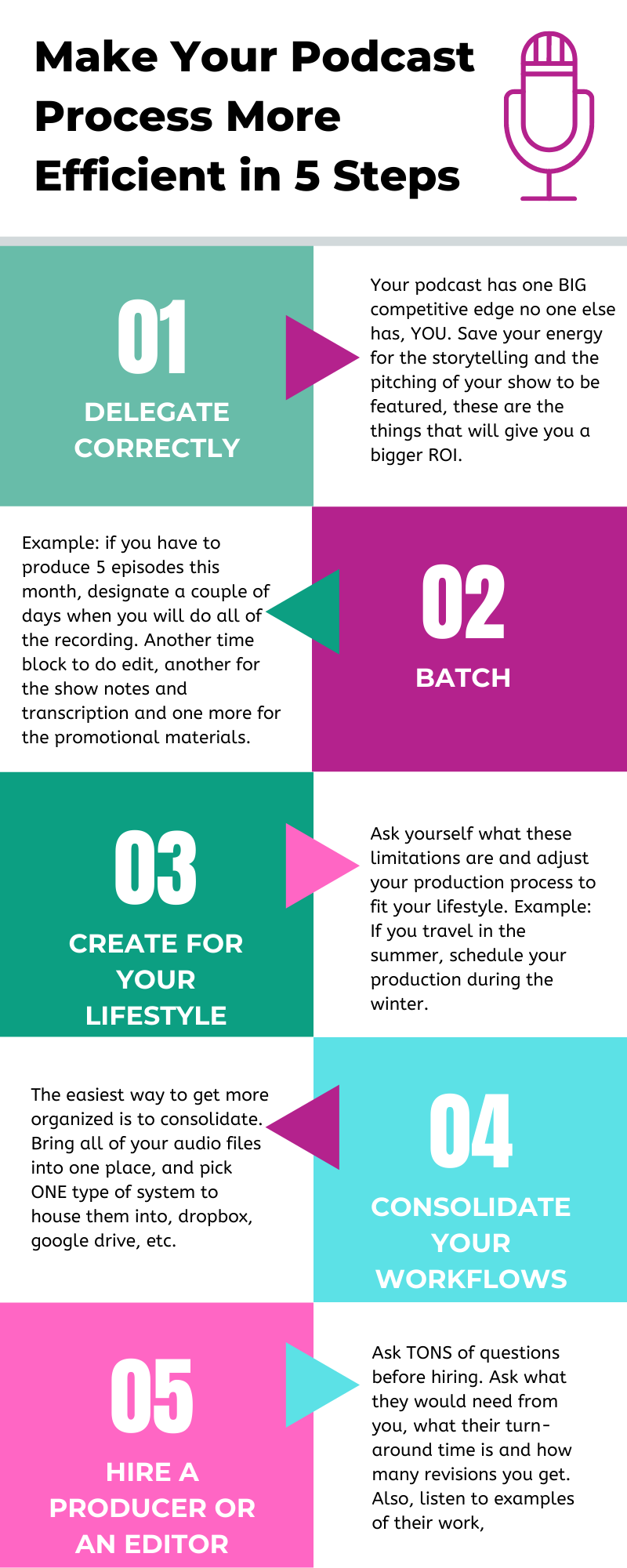How to Make Your Podcast Production Process More Efficient
How to Make Your Podcast Production Process More Efficient
What are you doing to make your podcasting journey more efficient?
I've been thinking about this a lot lately, and it's also one of the most popular questions my clients come to me to help them answer. That's why I wanted to share some quick tips with you below that can make a HUGE (in my 45th U.S. President voice) impact in your podcast production process. I wrote these recommendations with independent and small business creators in mind.
I made this into an infographic to help you remember, but you should also keep reading to get more out of these tips.
produce your podcast more efficiently in 5 steps.
DELEGATE CORRECTLY - This might seem like a no-brainer, but believe me when I tell you that most of my clients are not delegating correctly. They often delegate the most important parts of their creation process, like building the story or the pre-interviews, and even their pitching strategy to get on other shows, instead of the parts that can be automated such as the social media promotion, audiogram generation, transcription and graphic design. Your podcast has one BIG competitive edge no one else has, YOU. Save your energy for the storytelling and the pitching of your show to be featured, these are the things that will give you a bigger ROI. Working with a sound engineer or sound editor is life-changing because you will save tons of money. Especially if you don’t even have to mess with the tracks. In production we call this “paper cutting”, when you write your changes and edits to an audio engineer instead of touching the cut yourself.
BATCH - Batching is an independent podcast creator’s best tool. I mean, I’m not saying this is my strong-suit but I am saying it works! Batching is when you break up the production process into specific steps and then designate entire blocks of time to only work on each step at a time. For example, if you have to produce 5 episodes this month, you designate a couple of days when you will do all of the recording. Another set time block to do all of the editing, another for the show notes and transcription and another fort he promotional materials. My partner at BIPOC Podcast Creators, Tangia is much more efficient with this than I am. She teaches a class on how to survive Podfade and one of my favorite thing she teaches is how she does her batching. She can produce 20 episode in 60 days, which is MIND BLOWING to most podcast creators.
CREATE FOR YOUR LIFESTYLE - Are you bootstrapping your podcast? Are you short on time? Maybe you are too busy to manage all of the work that comes with producing a podcast. This is all fine. As long as you can recognize your limitations and create with your lifestyle in mind. Be realistic and honest with yourself. For example, if you like to travel in the summer, schedule your production during the winter so you don’t stress over the podcast while you’re away. Or, if you’re feeling overwhelmed because you have to produce a podcast episode every week, then change your publishing schedule to every other week. Just let your audience know. Another thing, do the math! If you find that your time is worth more than the average of $25-$50 per hour you could pay a professional sound engineer editor to help you, then hire help.
CONSOLIDATE YOUR WORKFLOWS - Your workflows need to be clean or you will never scale and grow your show. And by the way, you will drive anyone you hire crazy because they will be lost in your unorganized process. I’m guilty of file mismanagement. I have been known to file audio tracks in different places and later driving myself crazy trying to find them. The easiest way to get more organized is to consolidate. Bring all of your audio files into one place, pick oNE type of system, dropbox, google drive, etc. I prefer storing on the cloud because I work with editors. Make a decision of where you will manage your production process. If you like spreadsheets then make sure you stick t that process and save them all in the same location. The less apps and storage options you have, the easier it becomes later to automate and train help.
HIRE A PRODUCER OR AN EDITOR - Once you’ve done the math, you might come to the conclusion that hiring an editor or producer is possible. If this is the case, make sure you understand the differences between these two jobs, learn about the industry rate standards and also ask TONS of questions before hiring someone. Ask them if they can share examples of their work, ask them how long they think editing your show would take, what they would need from you, what their turn-around time is and how many revisions you get. All of these questions will help set you up for a successful working relationship.

